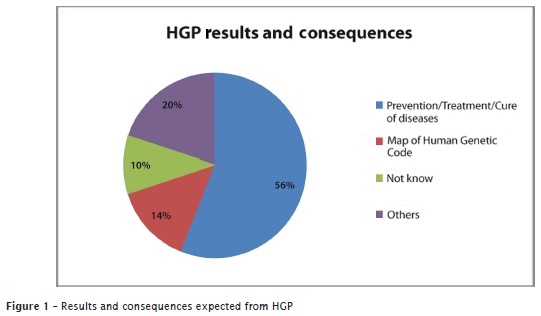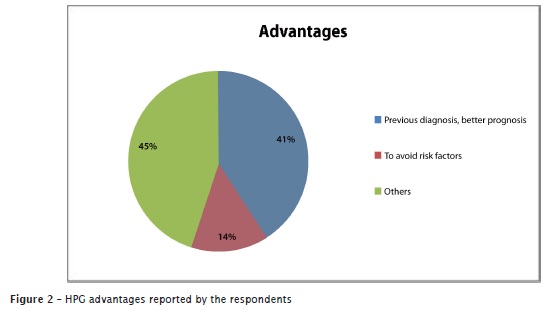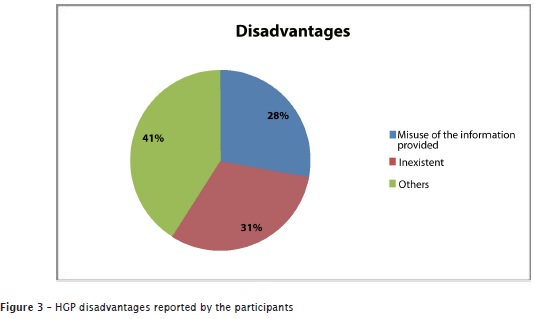Serviços Personalizados
Artigo
Links relacionados
Compartilhar
RSBO (Online)
versão On-line ISSN 1984-5685
RSBO (Online) vol.11 no.2 Joinville Abr./Jun. 2014
ORIGINAL RESEARCH ARTICLE
Knowledge of Human Genome Project among Dentistry undergraduates
Daniela Peressoni Vieira I; Thaisa Cezária Triches I; Marcos Ximenes Filho I; Ana Paula Silveira Caldeira de Andrada Beltrame I; Leila Posenato Garcia II; Mabel Mariela Rodríguez Cordeiro III
I Department of Dentistry, Federal University of Santa Catarina – Florianópolis – SC – Brazil
II Institute for Applied Economic Research – Brasília – DF – Brazil
III Department of Morphological Sciences, Federal University of Santa Catarina – Florianópolis – SC – Brazil
ABSTRACT
Introduction: The Human Genome Project (HGP) has allowed for advances in diagnosis and prevention of diseases. Objective: The aim of this study was to investigate the knowledge of undergraduates from the Federal University of Santa Catarina, regarding HGP and its applicability. Material and methods: Thirty-one students were interviewed by using a questionnaire with open questions, followed by qualitative and quantitative analysis through answers' grouping. Results: Only 4.5% did not know HGP, while most of them (83%) demonstrated knowledge gained from the media. Only 21% cited the undergraduate program as a source of information, 56% recognized advances in disease prevention and 81% reported applicability in Dentistry. 97% students would give blood samples for research, 28% reported concern about misuse of this information, while 31% did not report any disadvantage. Conclusion: It may be concluded that the students have some knowledge on HGP. However, it is not widely discussed during course, because the media was the main source of information.
Keywords: biotechnology; human genome; education; Dentistry.
Introduction
The Human Genome Project (HGP) started in the United States of America aiming at sequencing and mapping the human genetic code. Readily, it became a worldwide Project involving many countries, including Brazil. In 2003, the sequencing of almost all human genome (HG) was announced. HG consists of 23 pairs of chromosomes existing in all diploid cells of human beings, where DNA is found and all genetic features of an individual is stored 6.
The information obtained through HGP has been directly related with the routine of health professionals, including those of Dentistry. Some authors 10 have stated that except from trauma, essentially all pathologies and alterations affecting oral health have a great genetic component. Many genes accounting for tooth disorders, oral and craniofacial diseases have been identified along the project, e.g., the genes responsible for congenital hypodontia or even the most severe cases of dentinogenesis imperfecta. Thus, to know and understand the etiological mechanisms of these diseases will provide better diagnosis, prognosis and treatment.
Despite of the extraordinary importance that all new knowledge on human genetics will have in dental clinics, little efforts have been made to prepare undergraduates in relation to this new information and technology.
In 2001, a research was conducted aiming to analyze all 54 Schools of Dentistry of the United States of America to verify the presence or absence of genetic discipline within the curriculum and the need of a previous course on genetics for admission in Dentistry Course. Of the 53 responding schools, only eight included the discipline in the curriculum; of those not offering the discipline, most did not demand a prior course before admission 4. In 2004, other authors 1 developed a similar research, also in American schools, to know whether the genetics discipline was taught and whether a previous knowledge was necessary before admission. Of the 56 schools included in the research, only six had the discipline in the curriculum and only one demanded a previous course for admitting the student.
In Brazil a similar research was conducted in 2004 aiming to analyze the knowledge among undergraduates of the last year of Medicine, Law, and Biological Sciences Schools of the State University of Maringá (Paraná, Brazil) in relation to HGP. The result showed that generally the undergraduates had little or none knowledge on this issue 9.
To contribute with the patients' wellness and health, dentists should understand the role of genetics in oral health care. For this purpose, it is mandatory that they are familiar with the technological advancements and information obtained through HGP 5.
In Brazi l, the main source of scient i f ic information production and dissemination is the university. Therefore, it is of great importance to identify whether the information on HGP is being taught to undergraduates of health area.
Thus, the aim of this study was to verify the level of knowledge of last year undergraduates of the School of Dentistry of the Federal University of Santa Catarina (UFSC, Florianópolis/SC, Brazil) on HGP, its importance, repercussion and possible application especially in Dentistry.
Material and methods
The Dentistry course was selected as the sampling field because is one of the areas undergoing immediate HGP impacts. The study participants were the undergraduates regularly enrolled in the last year of the Dentistry Course of the University (UFSC). This study was submitted and approved by the Ethical Committee in Research on Human Beings under process no. #094/08.
The interviews were conducted in the University. All undergraduates of the last year of the Dentistry Course were invited to participate in the study, comprising a total of 96 students. Those agreeing in participating in the study, all read and signed a Free and Clarified Consent Form, resulting in 31 participants.
To obtain the information, a questionnaire was formulated, applied as interview, with the following open questions:
a) What do you know on Human Genome Project?
b) For you, what is genome?
c) How did you acquire knowledge on Human Genome Project?
d) Which results and consequences can be expected from Human Genome Project?
e) Which applicability do you believe that Human Genome Project has on Dentistry?
f) If you have been invited to provide a blood sample to contribute with Human Genome Project or other studies, e.g., to discover a gene involved in a disease without cure; evolutionary studies, would you provide it? Why?
g) Human Genome Project can anticipate the diagnosis of some diseases. Which advantages and/ or disadvantages do you see in this probability?
Aware of the objective, dynamics and anonymate guaranty, the permission of using a recorder was asked. One single researcher interviewed all undergraduates. Next, all recorded information was typed on a computer. The obtained data were submitted to a quali-quantitative analysis, by initially grouping equal or similar responses and then trying to detect in the response sets categories that enabled the grouping and differentiation of the answers.
Results
Altogether, 31 undergraduates were interviewed through an open-question questionnaire. Of these, only 4.5% reported they did not know what HGP is. In the question on genome, most (58%) responded it is the genetic code of the organism and only 3% reported not knowing about it.
Among the undergraduates responding having knowledge on HGP, most of them (83%) reported they had acquired this knowledge through the media. Only 21% of the respondents answered that the genetics discipline was the information source about the issue. Some undergraduates (52%) affirmed they obtained that knowledge also through other sources, while 7% answered that the subject had never been taught during graduation. Only 3% confessed not knowing the source of their knowledge. The answers regarding the results and the consequences expected from HGP are seen in figure 1.

About HGP applicability in Dentistry, 81% of the undergraduates reported at least one possible application. Among them, the identification of diseases as dentinogenesis imperfecta, amelogenesis imperfecta, agenesis, and other were cited. Only 19% of the undergraduates reported having little or none applicability.
Approximately 97% answered they would be willing to provide a blood sample to contribute with HGP and/or other projects. Only 3% of the undergraduates responded they would not provide a blood sample because they fear the possibility of identifying diseases.
Figures 2 and 3 displays the advantages and disadvantages reported by the undergraduates.


Discussion
Based on this present study results, notably most of the last year Dentistry undergraduates knew on HGP existence, since only 4.5% revealed they did not know what HGP was. Notwithstanding, some undergraduates provided more insecure responses, almost with doubt overtones: "I don't know much stuff, I will be sincere. I have already heard about it, but I don't know much"; "I have heard that it deals with human DNA, right?"; "It can discover many things, but I don't know what".
Although this knowledge is far from ideal, these data allowed the comparison of the study participants with the general average of Brazilian undergraduates. A previous study, in 2000, just after the announcement of DNA sequencing conclusion, demonstrated that only 4% of the respondents knew what genome was 7.
Data similar to those of this present study were found 9. The authors reported that although none undergraduate had shown total lack of knowledge on this issue, none showed deep knowledge on HGP and its possible applications.
Most of the respondents reported that the main source of information on HGP was the media and that little knowledge was acquired from the university: "Through lectures, television, specialized journals and internet". Some undergraduates told they had acquired knowledge also from other sources: "At the school itself, at secondary education I think I had some information, also in journals and internet". Only 21% of the respondents cited the discipline of genetics as source of knowledge: "At the genetics lectures of the third phase of the Dentistry Course".
This difficulty in transmitting the knowledge on genetics and its implications is not restricted to Brazil. Researchers found that only six American Schools of Dentistry had this discipline within the curriculum 1.
When the respondents were questioned about the consequences coming from HGP, most emphasized the increase in knowledge on diseases, providing their prevention, treatment and cure: "To discover cure for diseases, improve and prevent the diseases before they appear". Such result is in agreement with those within the literature, in which was reported that the knowledge acquired from HGP in addition to contribute to the comprehension of human genome, has a significant application in relation to the diagnosis of genetic diseases 2. Other authors reported that understanding the genetic contribution of some diseases would guide towards a better diagnosis and treatment 2.
With regard to HGP applicability in Dentistry, 86% knew to cite at least one possible applicability: "Likely any other disease, in Dentistry we also find oral diseases having genetic factors, such as cancer, some types of periodontitis, autoimmune diseases with oral repercussion, among others. The genome project may help in their prevention and cure". Some authors already emphasized HGP applicability in Dentistry. Researches described that many genetic mutations resulting in hypodontia have already been identified, causing different tooth absences. Many hereditary syndromes are also associated with the congenital absence of teeth 11.
In this study undergraduates were also questioned whether they were willing to provide a blood sample or genetic material to contribute with HGP or other projects, and evolutionary studies, to find out, e.g., a gene involved in a given disease. Most of undergraduates answered that they would provide, claiming they would be contributing for the sake of science and the other human being: "Look, I do think so, because it costs nothing. Many people donate blood to save other people and I believe that donating blood for a research that will help more people is the same thing". Other authors 9 also found a relevant willingness from undergraduates in contributing with HGP and other studies, in which 72.5% of the respondents reported that they were willing in providing genetic material and 12.5% would provide it with some restrictions as confidentiality, ethics, integrity and knowledge of the objectives.
Finally, when questioned on the advantages and/or disadvantages of HGP anticipating the diagnoses of some diseases, many undergraduates reported, among the advantages that the obtainment of an earlier diagnosis provides a better prognosis: "Definitely, we will be able to plan the treatment of these diseases with the early diagnosis, making a better treatment planning, and having a better outcome and prognosis for the patient". Others emphasized that it would be possible, through early diagnosis, to avoid some risk factors allowing the development of a given disease.
Concerning to the disadvantages, 31% of the respondents did not reported any disadvantage in anticipating the diagnosis of some diseases. On the other hand, 28% of them were concerned about a possible misuse of the obtained information: "Starting from the disadvantages, many have said on prejudice against people with genes predisposing to heart diseases or anomalies, so that they would undergo discrimination if this is reported, in relation to their jobs and the decision of parents whether a child should or should not be born". The concern on the misuse of the information from the advancement of molecular genetics is not recent. The ethical problems presented by the great development of molecular genetics and genetic therapy are already beginning 3. The ethically correct study, treatment and solution are demands that challenge the mankind and should be assured since its beginning 3. The advancement of molecular genetics also creates ethical fields for deciding on the application of the study outcomes, and which practical purposes of the outcomes can be used 8.
Therefore, corroborating other authors 10, this present study is an alert, because greater concern on reporting this knowledge should exist inside the schools, so that oral health professionals are graduated, especially dentists, able to understand and apply these new knowledge.
Conclusion
In the present study, undergraduates demonstrated superficial knowledge on Human Genome Project. This issue is not largely discussed on the Dentistry Course, because the media was the main source of information reported.
References
1. Behnke AR, Hassell TM. Need for genetics education in U.S. Dental and Dental Hygiene Programs. J Dent Educ. 2004;68:819-22. [ Links ]
2. Bueno MRP. O Projeto Genoma Humano. Rev Bioét. 1997;5:145-55.
3. Clotet J. Bioética como ética aplicada e genética. Rev Bioét. 1997;5:173-83.
4. Dudlicek LI, Gettig EA, Etzel KR, Hart TC. Status of genetics education in U.S. Dental Schools. J Dent Educ. 2004;68:809-18.
5. Gettig E, Hart TC. Genetics in Dental Practice: social and ethical issues surrounding genetic testing. J Dent Educ. 2003;67:549-62.
6. International Human Genome Sequencing Consortium. International Consortium Completes Human Genome Project [serial online]. 2003 [cited 2010 May 5]. Available from: URL:http://www.genome.wi.mit.edu/media/2003/pr_03_humangenome.html.
7. Leite M. Biotecnologias, clones e quimeras sob controle social: missão urgente para a divulgação científica. São Paulo Perspec. 2000;14(3):40-6.
8. Pessoa OF. Fronteiras do biopoder [serial online]. 1997 [cited 2010 May 5]. Available from: URL:http://www.portalmedico.org.br/revista/bio2v5/fronteirasbiopoder.htm.
9. Sganzerla LCM, Corazza-Nunes MJ, Nunes WMC, Tomanik EA. Preparados ou não para o futuro? Atitudes de alunos de graduação em relação ao Projeto Genoma Humano. Acta Scient Biol Scienc. 2004;26:239-50.
10. Slavkin HC. The human genome, implications for oral health and diseases, and dental education. J Dent Educ. 2001;65:463-79.
11. Wright JT, Hart TC. The Genome Projects: implications for dental practice and education. J Dent Educ. 2002;66:659-71.
 Corresponding author:
Corresponding author:
Mabel Mariela Rodríguez Cordeiro
Departamento de Ciências Morfológicas, Centro de Ciências Biológicas
Universidade Federal de Santa Catarina, Campus Universitário – Trindade
CEP 88040-900 – Florianópolis – SC – Brasil
E-mail: m.cordeiro@ufsc.br
Received for publication: February 18, 2013
Accepted for publication: December 9, 2013













